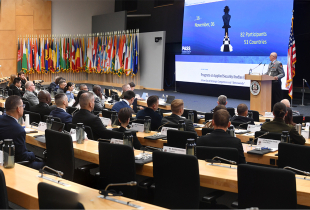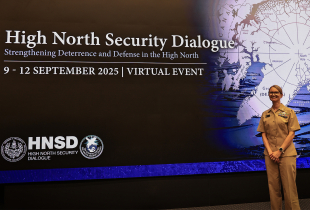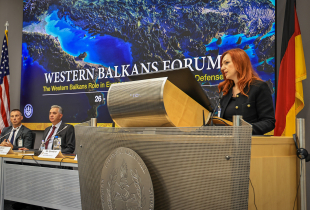
Multinational Experts Innovating Defense Education Methods in Partner Countries
By Partnership for Peace Consortium
ZAGREB, Croatia (7 July, 2015) – NATO and the Partnership for Peace Consortium (PfPC) recognize that technological innovation is central to defense education modernization. With this aim in mind, a multinational team of 40 experts across 12 countries kicked off an Education Development Working Group (EDWG) workshop today in Zagreb, Croatia to assist partner nations with modernization of their defense education institutions.
Croatia’s Chief of Defense, General Drago Lovrić, welcomed the multinational team, expressing his appreciation of support to NATO and the PfPC for EDWG, Defense Education Enhancement Program (DEEP) and related assistance in Croatia and other partner countries. General Lovrić underscored the need for the Croatian Defense Academy and partner institutions to implement “blended learning” practices into classrooms, and to "underdo transformation, pursuant to the new security environment, to increase the intellectual strength of the armed forces."
General Lovrić’s remarks are timely, as Croatia became the 13th, and newest DEEP recipient country earlier this year. Remarking on the importance of the DEEP program and related efforts, Pavel Anastasov, Policy and Programs Officer from the NATO International Staff’s Political Affairs and Security Policy Division, cited the 2014 NATO Wales Summit, which specifically called out the DEEP program as a capacity building effort "crucial for NATO cooperative security endeavors."
In speaking about the DEEP program, John Kane, Operations Director for the PfPC, noted that the Croatian DEEP program is the first in a NATO allied country, and “it is the result of the leadership of the Croatian Ministry of Defense and General Lovrić.” According to Mr. Kane, the initiation of the Croatia DEEP program continues a trend of announcing new DEEP programs in conjunction with multinational annual EDWG workshops. In 2014, Serbia hosted a multinational event to launch the Serbia DEEP program, and in 2013 Ukraine hosted a similar EDWG event to kick off the Ukraine DEEP program.
Mr. Kane further elaborated on the growth of the PfPC’s defense education cooperative programs, stating that the PfPC Defense Educators' Program, which falls under the EDWG’s broad umbrella, is the fastest growing program in the PfPC. To accommodate the growth of the program, Mr. Kane commended the efforts of Dr. Reid-Martinez, Chair of the PfPC EDWG’s Annual Programs, as Dr. Reid-Martinez has expanded the EDWG’s team of experts accordingly. The expanded team present at the EDWG multinational workshop will remain in Zagreb through 16 July to begin working with Croatia’s Defense Academy on modernization efforts.
Dr. Reid-Martinez’s team underlined the role that technology plays in modernization efforts with partner nations. Technologies such as online Learning Management Systems (LMS) and tablets are indeed revolutionizing electronic learning. Several partner nations outlined progress achieved in implementing learning technologies into their entire educational process, from up-front design of courses to classroom delivery of electronic learning materials.
Georgia, Moldova, and Armenia specifically discussed their progress in implementing the ILIAS LMS, which NATO and the PfPC support through the Advanced Distributed Learning Working Group (ADL WG). Such an exchange of information on national programs is valuable to countries who are seeking to implement ILIAS or similar systems. Ms. Tanja Geiss, and Mr. Gigi Roman, who run the ADL and electronic learning programs at the NATO School in Oberammergau, offered assistance to partner countries who are at various stages of implementing electronic learning systems.
As participants across partner countries shared their national experiences with electronic learning and defense education modernization, it is evident that the collaborative nature of such EDWG workshops fosters a convergence in thinking, as each country seeks to implement the best practices of partner nations. This intellectual convergence, according to Dr. Reid-Martinez, enables all participants to "become part of a broader community to enhance defense education in the entire region, constructing knowledge and wisdom."
For more information about the EDWG, the ADL WG, and the DEEP program, please visit www.pfp-consortium.org.


